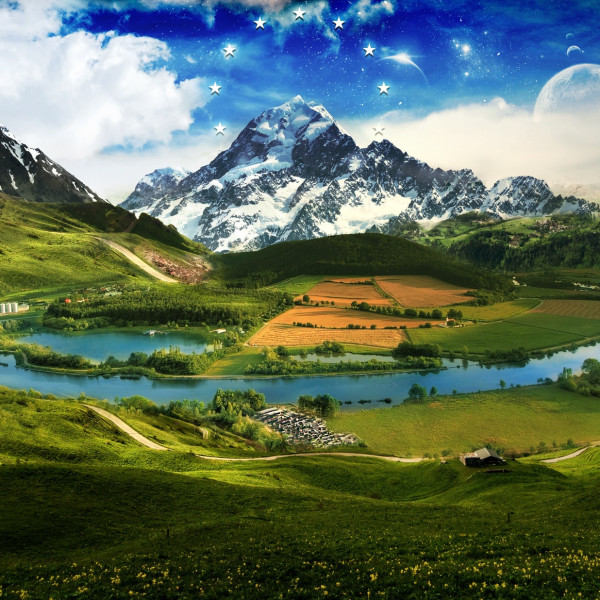Environmentalism Mandates Transhumanism

In one billion years, life on Earth will be gone.
Five billion years from now, the Sun will expand to encompass the Earth. But long before that happens, the rising temperatures of the Sun will boil the oceans, and make the planet uninhabitable.
Every animal, plant, living creature, and microorganism will die. Every species will be driven to extinction.
And all the life we know about in the universe—will perish.
Scientists tell us that life has existed on this planet for approximately 3.5 billion years. This means that the natural history of life on this planet is more than 75% done. Mother Earth is in her waning years, three quarters of the way to total extinction.
But Mother Earth has produced one species capable of helping her avoid this fate—one species that can deflect killer asteroids, divert rogue comets, cool the atmosphere, and save the world.
That species is us.
Humans don’t often realize it, but we play a unique role in the ecosystem. We are the only species capable of foreseeing long-term problems, and devising long-term solutions. We are the only species capable of foreseeing—and preventing—Mother Earth’s own ultimate demise.
In fact, we already have a plan for doing this. All we have to do is to land rockets on comets, give them a small nudge, and change their trajectories just enough so that over the next billion years, as they swing past the Earth thousands and thousands of times—they gently tug its orbit outward, keeping it perfectly balanced against the rising temperatures of the Sun.
This plan no doubt has some downsides, and will need tweaked and updated over time. Perhaps we should replace it with a different plan altogether.
The point is that, with only a few decades of even being aware of the problem, we’ve come up with a solution that is already within our technological abilities. Who knows what we could come up with, given more resources, or another few hundreds or thousands of years?
Of course, humans have been incredibly destructive. Scientists call our time period the Anthropocene, the Earth’s sixth great extinction event. Our impact has been similar to the asteroid that killed the dinosaurs—leading many to wonder if the Earth would be better off without us.
Primitivists, like the recently deceased Daniel Quinn, take this idea seriously—arguing that the only way forward for humanity is to revert to a pre-agricultural lifestyle, doing away with our technology, and returning to live as just another creature within the web of life.
This would, they admit, require the death of billions of people. Pre-agricultural lifestyles can’t support seven billion people on this planet, and would actually create more environmental destruction than we produce now. So the only reasonable Primitivist plan requires massive forced sterilization, or dramatically reducing the human population in less savory ways.
Even if we achieved this, what would happen then?
An abandoned technological civilization doesn’t just disappear overnight. Who can imagine the vast waves of environmental catastrophe unleashed, as nature overtakes our cities, our oil refineries, our nuclear reactors?
How much fresh new environmental destruction would fall out from a world after people?
And then, how long would it take for the world to recover? How long would it take for the ecosystem to rebound, for biodiversity to be replenished, for the impact of our fossil fuel extraction to be rectified?
To a rough approximation, it looks like the Earth might just be able to recover in time for the Sun to put an end to the whole business.
But perhaps another intelligent species could rise up and do a better job?
Not so, says astronomer Sir Frederick Hoyle, the man who coined the term “Big Bang”:
It has often been said that, if the human species fails to make a go of it here on the Earth, some other species will take over the running. In the sense of developing intelligence this is not correct. We have or soon will have, exhausted the necessary physical prerequisites so far as this planet is concerned. With coal gone, oil gone, high-grade metallic ores gone, no species however competent can make the long climb from primitive conditions to high-level technology. This is a one-shot affair. If we fail, this planetary system fails.
Primitivists make a compelling case, and their critique of human technological civilization should be taken seriously. But Primitivism cannot save the Earth from its fate.
If we want the Earth to survive and flourish, it looks like we are its only hope.
We have caused untold damage, and unleashed vast destruction. But the good news is that if we stick around, we can not only reverse the damage we’ve caused, we can help life thrive like never before. We can resurrect extinct species, and restore long-gone ecosystems. We can raise whales, bison, and large predators to their former glory and far beyond.
We can help life flourish at levels never before seen.
But in order for us to make that happen, we’re going to have to stick around for the next billion years. We’re going to have to keep developing our technological abilities, and extending our technological reach.
We’re going to have to become transhumanists.
If we could ask Mother Earth what she thought about all this, perhaps she would express regret at the destruction that has been caused. But perhaps she would also say that this is exactly why we came into existence.
Perhaps she would say that humanity was a risky proposition—but that the prospect of avoiding inevitable extinction was worth the risk. Perhaps she would say that out of all the possibilities, she chose us, because she wanted to live.